

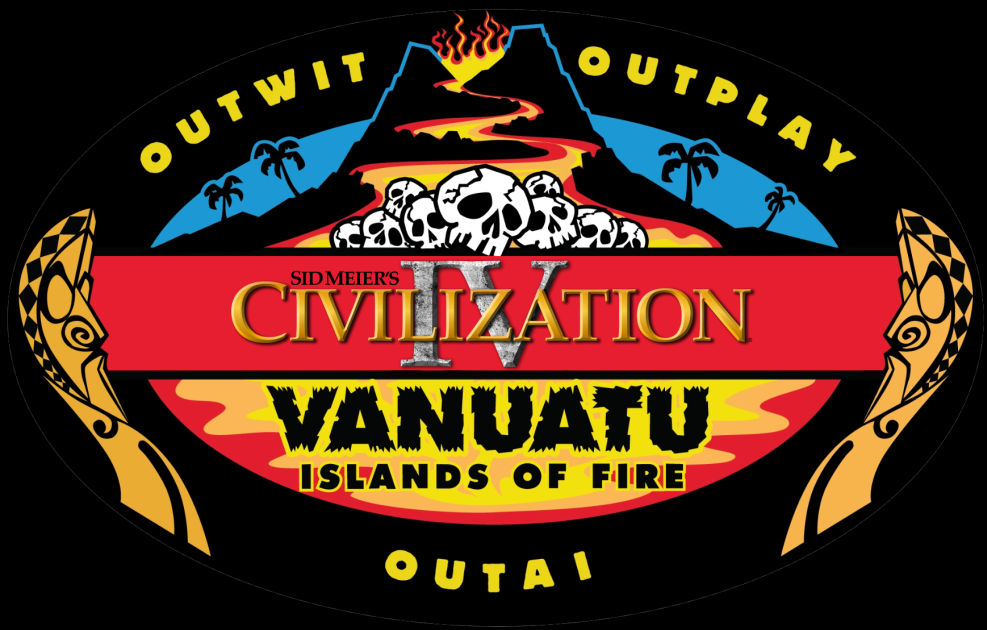
This summary for Game Eight was written by Eauxps I. Fourgott. Many thanks for volunteering to put this report together! 
The final game of this season's opening round featured a hodgepodge of leaders, as befit the seven who had not been chosen for any of the previous games. Of those seven, the two who were widely considered to have no chance were Washington and Ramesses; not only were these mostly-peaceful leaders outnumbered by the low peace weight leaders, they also both had central starting positions ripe for attack, and lacked any nearby copper while several of their more aggressive rivals had the metal at their capital city locations. In particular, attacks would surely come from this game's two biggest warmongers, Napoleon and Genghis Khan, who both started at the south of the map flanking Ramesses. The Khan was one of those leaders with guaranteed early copper, which combined with his extremely high aggression would make him one to watch from the early going. Up in the map's north, the winner was widely expected to be either the competition's highest total scorer, Huayna Capac, or else the less-flashly but still-competent Louis XIV; in addition to Huayna's excellent track record and favorable diplomacy for both, they each had copper to allow them to go to war early if they so chose. Finally, Season 4 champion Charlemagne was tucked away to the east, far from the other leaders' starting positions. He had favorable expansion prospects in this game, but the diplomacy wasn't looking so great, so he'd need to play a good opening in order to safely move on.
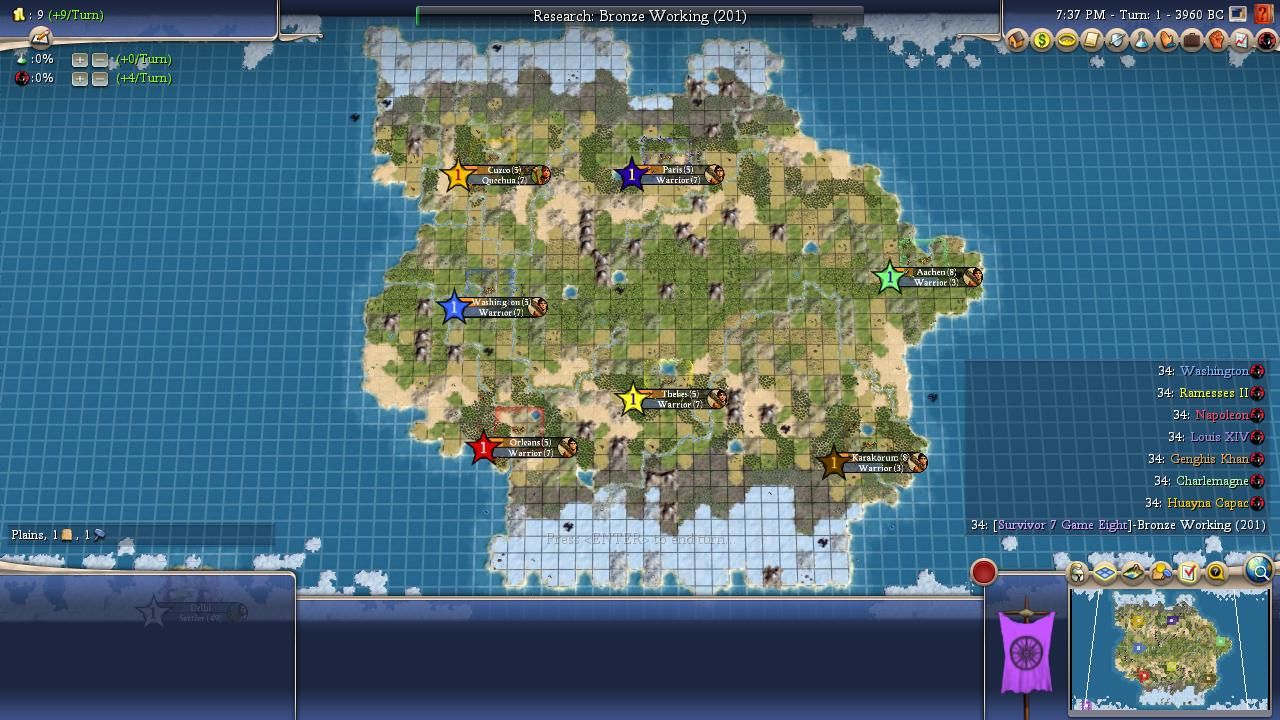
This game's opening was fairly tame; most leaders played it fairly normally, and we certainly didn't see anybody playing as badly as half the field had in Game 7. By far the leader playing most unusually was Genghis Khan, who instead of filling out all of the space around his capital chose to send a line of aggressive settlements far to the north. Even though there was still room further south, Old and New Sarai were both planted along Charlemagne's western border, and New Sarai was actually directly between Charlie and Louis! This would establish Mongolia as one of the stranger-shaped nations we've seen in these games, a long snaking country stretching up between the others with a comparatively tiny core. Genghis was, of course, also getting minimal value from these settlements by refusing to tech Mysticism early on, although he did at least get a nice bonus when a silver resource popped from one of his mines at an early date.
There wasn't space for such shenanigans over to the west, where quarters were quite cramped. Poor Washington in particular had virtually no room to the north of his capital after Huayna Capac planted his second city directly between the two leaders and immediately founded Islam there, ensuring that America couldn't get a good cultural foothold. (Washington's refusal to tech Mysticism also didn't help with that at all.) Still, Washington was quickly sticking cities in the space that he did have, the first leader to six, and crucially was able to secure a source of iron to his northwest - with Huayna and Napoleon grabbing the other nearby metals, Washington would have been sunk without this one, but instead he'd be able to fight on an even field when the time came. To his south, Napoleon was similarly very low on space, jamming as many cities as he could in the space that he did have, but refusing to put any culture in them; about the only good thing he had going on was solid early research thanks to a gold resource at his capital. On the flip side, Huayna to the north claimed a good amount of land with his first four cities, and still had plenty of backlines to fill... only to stall out on expansion, still stuck on four cities by the time everybody else had six. He was tying his cities up on wonder races that he wasn't even winning, and bizarrely was completely refusing to build cottages in his territory, choosing to emphasize production instead and thus ending up with far worse research than expected. Between that and the fact that his Islam spread to no neighbors - indeed, everybody except he and Charlemagne would ultimately adopt Ramesses' Judaism - the predictors' favorite was far from a great position.
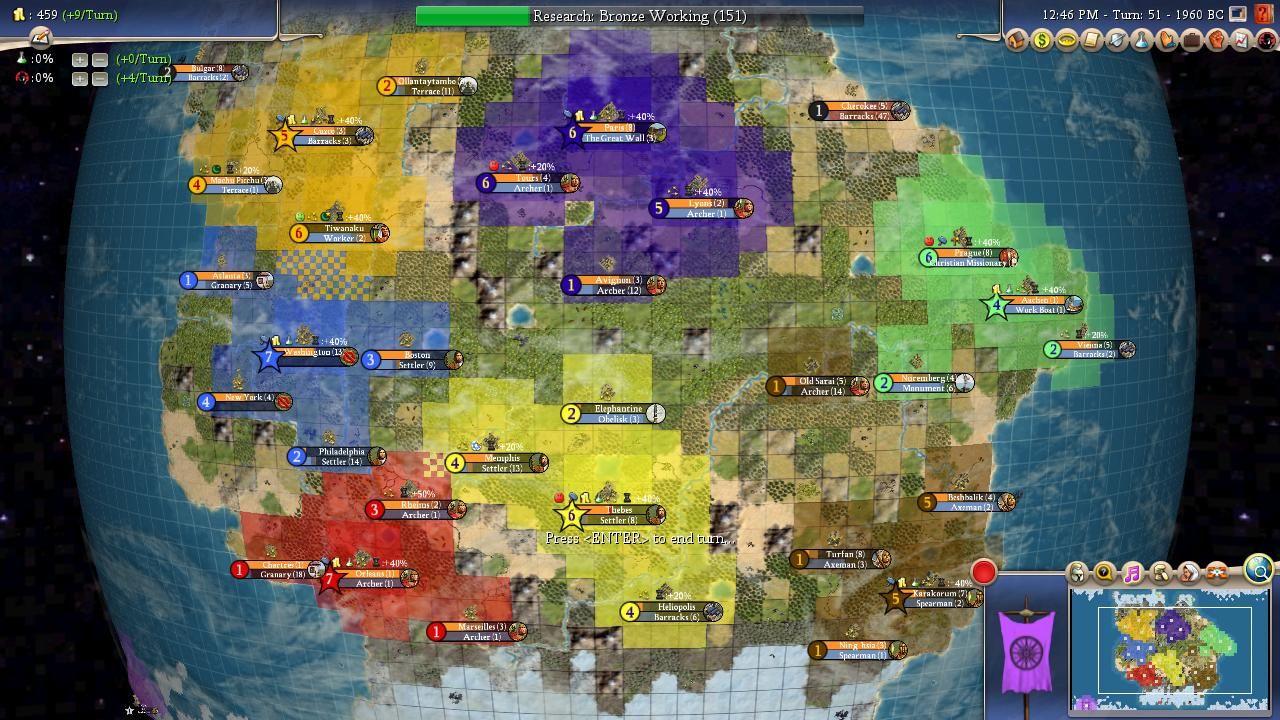
On the eve of the first wars, the scoreboard was still topped by those leaders who had strong early culture - Huayna, Ramesses, and Louis. Louis was on top right now, thanks to a nice capital location, average landgrab, Creative trait, and building several early wonders. He had one of the less cramped positions, and did indeed appear to be one of the best-positioned leaders at this point. Ramesses had largely played a solid opening, but with one glaring flaw: he had no metals! There were none close to his capital location; an iron source 5 tiles away was the closest he had, and he stubbornly refused to tech Iron Working for a long time. Without being able to see the iron, he happened to settle two different cities three tiles away from it, but none anywhere to get it within range soon. That represented a huge weakness, and surrounded as he was by likely enemies, his long-term position was very shaky. As for the others, Washington was doing pretty well for a leader with no culture, the clear top-scorer of that group. Genghis and Napoleon had little to show so far except for strong city counts, while Charlemagne had gotten out to a rather tepid start for the founder of one of the first religions. His rate of expansion had been mediocre despite his Imperialistic trait, he had thrown away an early advantage in the form of gems at his capital by failing to research Mining until after Turn 50, and as a result, while his position was far from disastrous, he had been a very slow starter and now would have to rely on favorable diplomacy and opportunities in order to get ahead.
The game's first war was declared rather early, on Turn 69, but it came from an unlikely source:
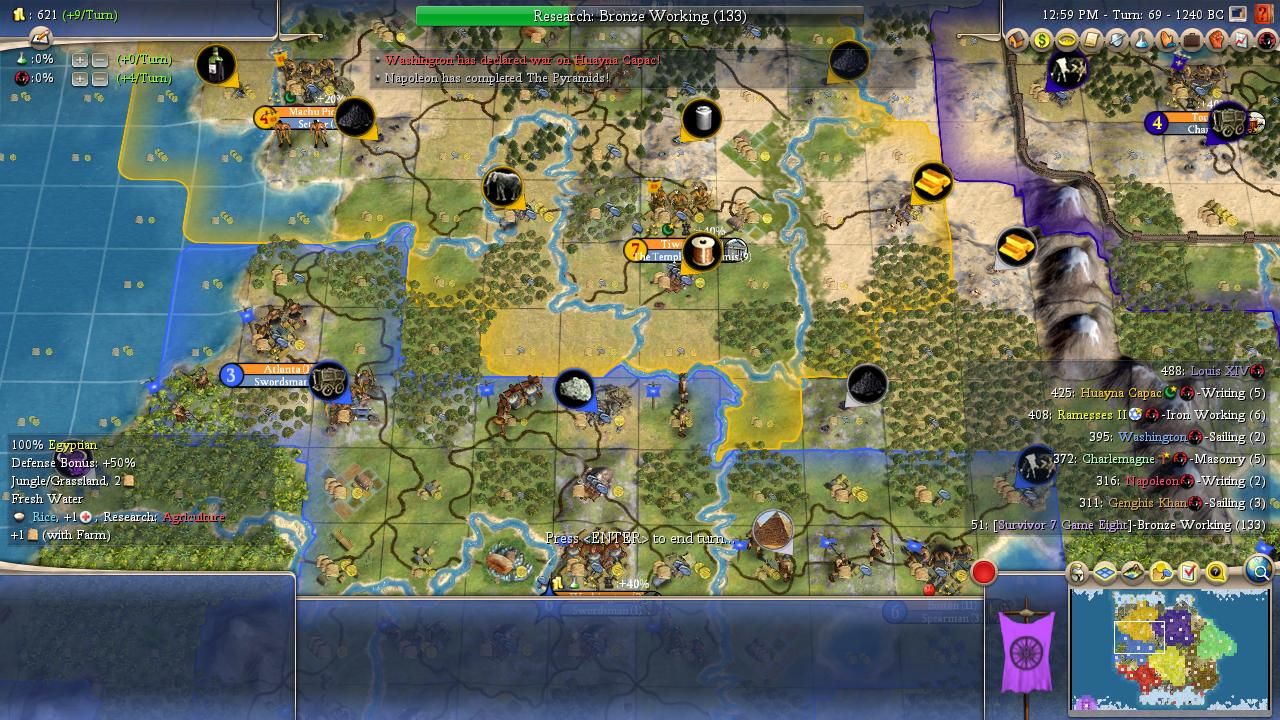
All these aggressive leaders in play, and it was Washington who started the fighting. Go figure. This first war was an immediate stalemate; Washington attacked with only an average-sized force and was not close to catapults, so this conflict merely served to stunt the development of both civs. In the center of the map, Louis soon chose a much wiser target for his first war: Ramesses! The Egyptian leader not only lacked metal, he still hadn't even researched Iron Working yet and didn't know where any iron was! Louis took a border city with no trouble at all - the city that had been the closest to claiming iron - and was perfectly poised to execute a speedy conquest and become the runaway AI. Perfectly poised, that is, until a wrench was suddenly thrown into the whole operation:
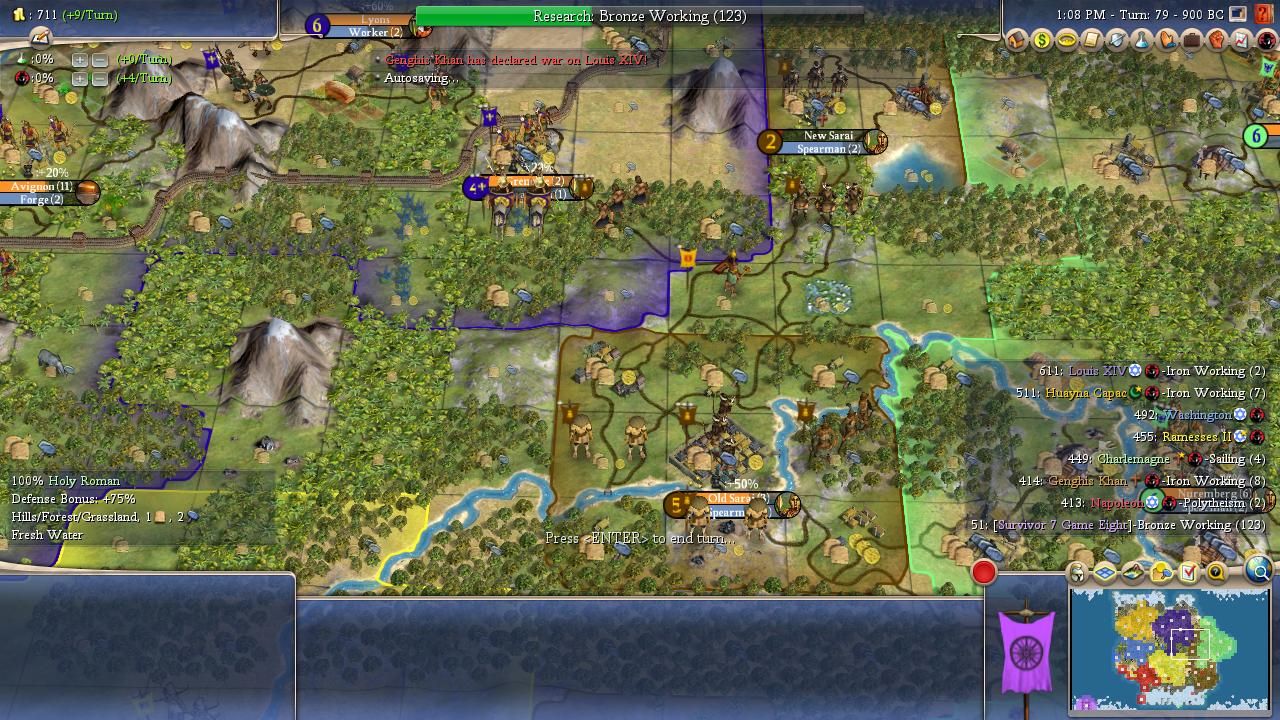
Determined to make this a wacky game, Genghis chose to march far to the north and attack Louis with his first war. The really crazy thing was that in context, this actually wasn't that unlikely of an event! It would have seemed insane at the start of the game, but thanks to his troll city plants, Genghis actually did share the most border tension with Louis at this point, in addition to practicing a different religion at the time he declared war. In any case, this declaration had a huge impact on the game. Louis now had a serious war on his hands; he would not be able to get a speedy conquest, and so Ramesses would survive, signing peace soon afterwards to get out while down only a single city. Louis himself would not be running away with it, but instead would remain close to the rest of the pack, if still in first place. Genghis himself got nothing out of this, eventually signing peace with no cities changing hands, but he'd made an indelible mark on the game.
With Louis's conquest thus halted, the game entered a state of stalemate, as we were still in the pre-Construction era. Genghis's next target was Charlemagne, but he had no better luck attacking Holy Rome, tossing away stack after stack in fruitless assaults on well-defended cities. Washington and Huayna Capac eventually signed peace when Napoleon attacked America from the other side, but Washington successfully fended off the French, with Napoleon handing back the only city he had successfully captured when the two signed peace. With nobody making any significant military gains, then, Louis continued to lead the pack in both score and power. He had a solid-sized empire, hadn't wasted many resources in his wars so far, and with his central position, he could strike almost anywhere with a decisive impact. To his west, Huayna was using his newfound peace to build into a strong second-place position. He still had plenty of backlines to settle after his initial war, allowing him to make up for the lost time, and even icy fishing villages were useful to him thanks to his Financial trait and the Colossus doubling each water tile's commerce. Washington wasn't able to recover in the same way; the remaining space around his central position had been snapped up as he fought, and while he was holding all of his cities for now, long-term his position wasn't great. Ramesses had done a better job of building up; he had established a solid position during his own peaceful period, helped greatly by a successful monk economy. His Judaism had spread far and wide and his shrine was taking in a lot of income as a result, and he had ultimately succeeded in securing a source of iron some distance to the southeast. Meanwhile, Napoleon seemed to be taking a page from Montezuma's playbook in this game, playing far less aggressively than normal. He wasn't interested in going to war right now, but instead continued to quietly tech upwards and build wonders like the Hagia Sophia and Great Library that you don't normally see the warmongers go for. Finally, Charlemagne and Genghis Khan were stagnant in their war and neither had accomplished much of anything in this game. It wasn't looking great for either one of them.
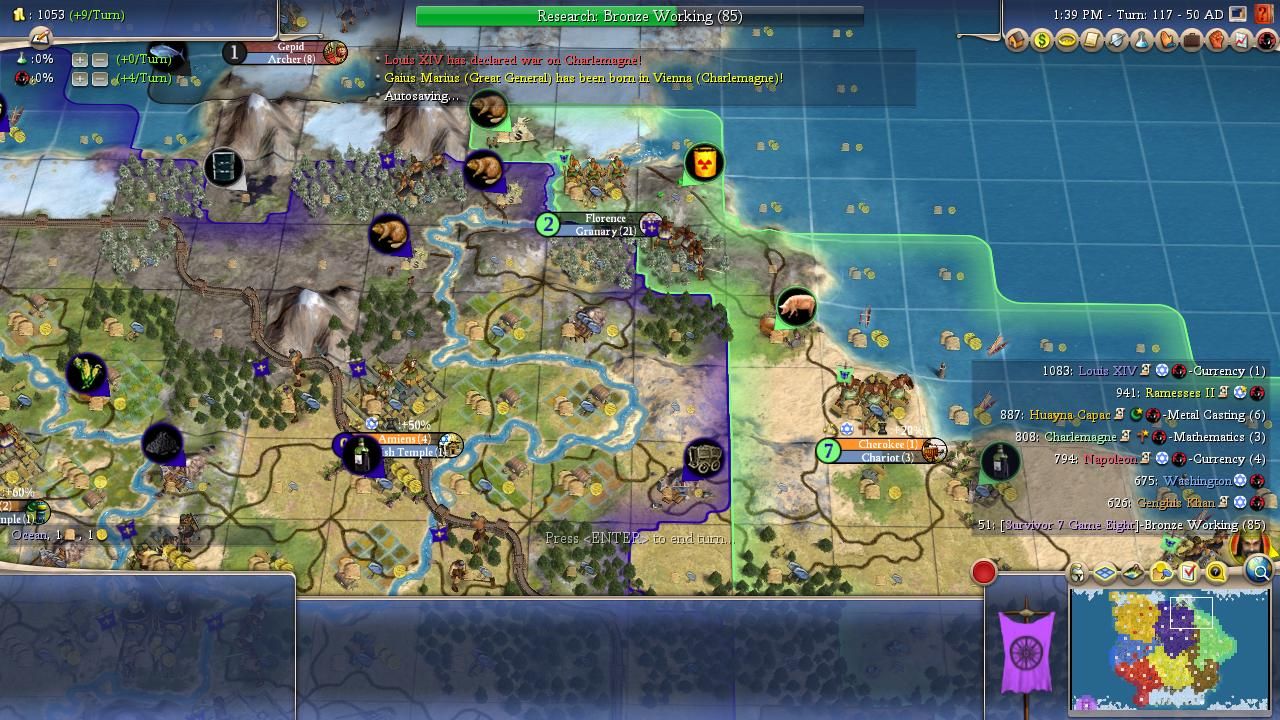
Louis was the one who finally got things moving again, as when he went back to war, he once again chose a smart target, this time Holy Rome. With Charlemagne busy fighting off the Mongols, this was a perfect time to plunge the dagger into his back. The only issue for Louis right now was that he lacked catapults, but even without those he powered through three northern Holy Roman cities with little trouble, even as Charlemagne hurriedly signed peace with Genghis Khan. The lack of catapults proved an issue at Prague, Charlie's first core city, as Louis lost an attack stack in a minor setback. However, he had picked up Construction by this point, and with catapult support the second stack he sent was big enough to get the job done. It was clearly only a matter of time for the Burger King. Over to the west, Huayna and Washington were soon at it again, the Incan leader initiating hostilities this time. Washington got the first strike in and annihilated the Incan attack stack, but his own attacks went nowhere and it quickly became clear that he was the weaker party in this war. To the south, Genghis wasted little time getting back on the warpath. this time attacking Ramesses. Unfortunately for him, Ramesses had a stronger production base and a slight lead in military tech, allowing him to get the upper hand. Genghis was able to force his way in and capture a couple of cities, but Ramesses could do the same, and his normal-shaped empire was much more defensible than Genghis's odd snaking one - especially as the first two cities he took neatly separated the Sarais from the Mongolian core. Rams was soon able to retake the cities he had lost, establishing Egypt clearly as the winning side.
While all three wars had a clearly winning leader, one of those leaders was prosecuting his conquest much more efficiently. Ramesses and Huayna slowed more or less to a standstill for a while, but Louis was both quickly and methodically taking out Charlemagne's remaining cities. Napoleon finally broke his peace to attack from across the map, getting all of one city (which he then gave to Genghis Khan) for his troubles, but Louis took the rest to score the kill and ensure that no opening round game this season would see both seeded leaders advance. Charlemagne played a mediocre opening this game, then got backstabbed by a stronger rival while distracted, and that was about it for his game. He didn't do anything especially wrong here, but he also didn't do anything especially right. His opening ensured that he'd need some good breaks in order to come out on top, and instead he got a bad break. Despite his past successes, he's been shown to not be the most dynamic AI in this competition, and this result certainly bore that out.
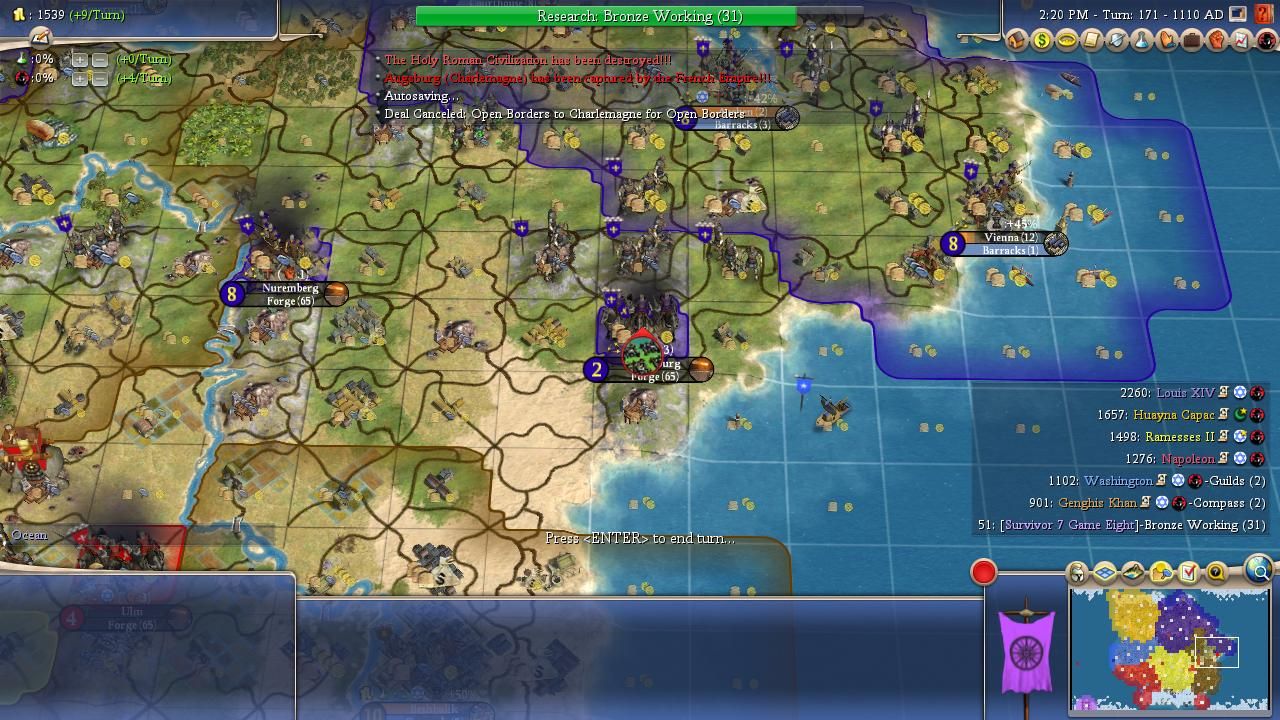
In the aftermath of this war, Louis was the clear game leader and a non-Cultural win by anybody else looked extremely unlikely. His well-timed backstab had been a key moment in the game: he'd already been ahead at the start of this war, and becoming the only leader so far to conquer significant territory only compounded his advantage. He now liked everybody else on the map, leaving it a big mystery where he would attack next, but whoever the unfortunate target was would be in serious trouble. As for the bigger picture, there was a clear hierarchy: Huayna was clearly in second place, Ramesses in third, Napoleon in fourth, and Washington and Genghis were in the process of getting conquered. This status quo remained stable for a while; the only event of note was Huayna buying Napoleon into his war with Washington. This ensured Washington would be the game's next casualty, but in retrospect may have been a mistake by Huayna, as he was winning the war anyway and Napoleon was able to take half of Washington's cities, cutting into his spoils. Indeed, it was Napoleon and not Huayna who scored the kill, on Turn 199. Washington had gotten out to a promising start in this game, but his fatal mistake had been attacking Huayna as early as he did. Without Construction or overwhelming force he had no hope of making significant progress, and he gave up his chance to expand further and really become one of the stronger nations. Huayna was able to recover from this due to his corner position with empty backlines, but by the time Washington was finally done with his wars, he was no stronger for them. That left him as one of the game's weaker powers, and from there it was only a matter of time.
In the wake of his conquest, the status quo was the same as before, but with several Mongolian cities left still to capture, Ramesses appeared poised to take over second place. But then everything was plunged into chaos:
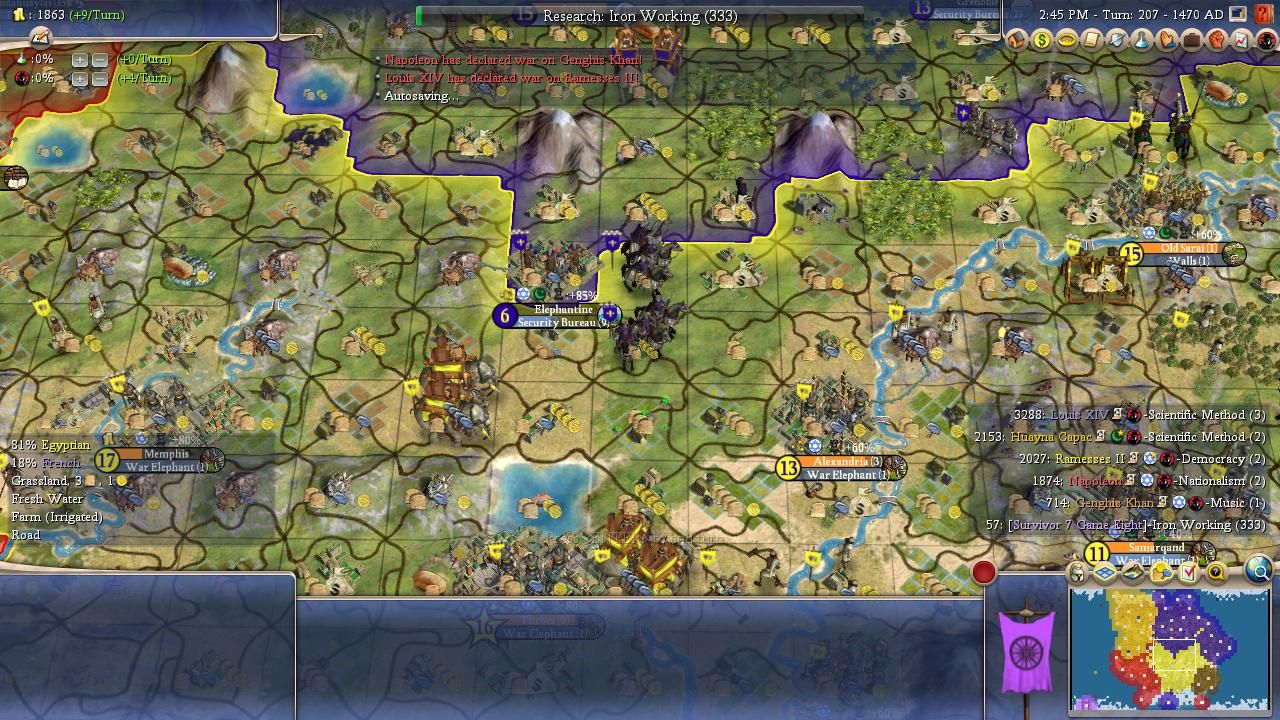
Louis came crashing into Ramesses! That immediately brought the Egyptian conquest of Mongolia to a halt, as Ramesses turned to deal with the new threat, but he also made sure Genghis wouldn't get off the hook, immediately bribing Napoleon into war with the Khan. Napoleon dutifully marched his entire army across the map, but as soon as they got to Mongolia, he found he had much bigger problems, as Huayna seized a golden opportunity and declared war on him! The status quo was being shattered and a new era of war ushered in. One thing these developments did NOT do, however, was save Genghis. Napoleon might now be in a two-front war, but his main stack HAD gotten to Monglia first, they were determined to finish the job, and they were fighting a foe that had already been largely defeated. Soon the Khan exited the game. This was an entertaining performance from Genghis, but not a very effective one. His bizarre settling pattern and low cultural focus left him with an empire limited in territory and difficult to defend effectively, and he still didn't found enough total cities to become a really strong player. From that point on, he served to troll the other leaders instead, first attacking Louis to prevent him from becoming a runaway and save Ramesses, then softening Charlemagne up for a Louis backstab and paving the way for him to be First to Die. After Montezuma's win last week, Genghis's performance here was a good reminder of what normally happens to the crazy warmongers - they get bogged down in fighting but can't get strong enough to truly compete for the win. As a result, Genghis continues to be one of the competition's only two leaders to never make the playoffs. His big day will have to come another season.
Elsewhere on the map, Louis had been widely expected to conquer most if not all of Egypt in this war, but instead he surprisingly stalled out. There were very heavy casualties on both sides, and neither he nor Ramesses could seem to get a decisive edge - Louis was able to push through and capture the capital of Thebes, but after that didn't seem to be able to mount any more significant assaults. Ultimately the two leaders ended up signing peace, Louis handing Thebes back in the treaty, and so this war only served to set both leaders back. Louis had lost his power lead to Huayna Capac, while Ramesses had been denied the chance to complete his conquest and take the rest of Mongolia. The military path having failed for him, Louis decided to change tracks and pursue a Cultural victory instead; he had four of the world's Holy Cities, which made this a likely choice for him. He beelined to Mass Media and then flipped on the slider, and was now due to win by Turn 300 if nobody stopped him - but like Hatshepsut last game, he had NOT teched Rifling before doing so, leaving himself vulnerable.
Meanwhile, Huayna's attack on Napoleon was much more decisive. With half the French army on the other side of the world, he was able to make gains quickly, and he teched Rifling first, in the opening turns of the war, to increase his edge. Napoleon would eventually tech Rifling himself and get his stack back from their Mongolian campaign, but by that point the Incans had a massive power edge to go with their much larger production base, and there was nothing he could do to stop the onslaught. He would simply have to defend as well as possible and hope his eastern enclave could survive until the end of the game. In the east, Louis couldn't seem to make up his mind about what he wanted to do. Despite having committed to the cultural victory attempt, he went ahead, built up for war, and attacked Ramesses for a third time. This initially seemed suicidal as Ramesses now had rifles while Louis did not, but Louis had teched up to cannons and grenadiers before stopping research, and had far more units than Ramesses. As a result, this war did not blow up in his face, and he was instead able to capture four cities and convince Ramesses to give up a fifth for peace. But now, back at peace and in the perfect position to race for culture... he turned the slider back off?!? What was this guy doing?
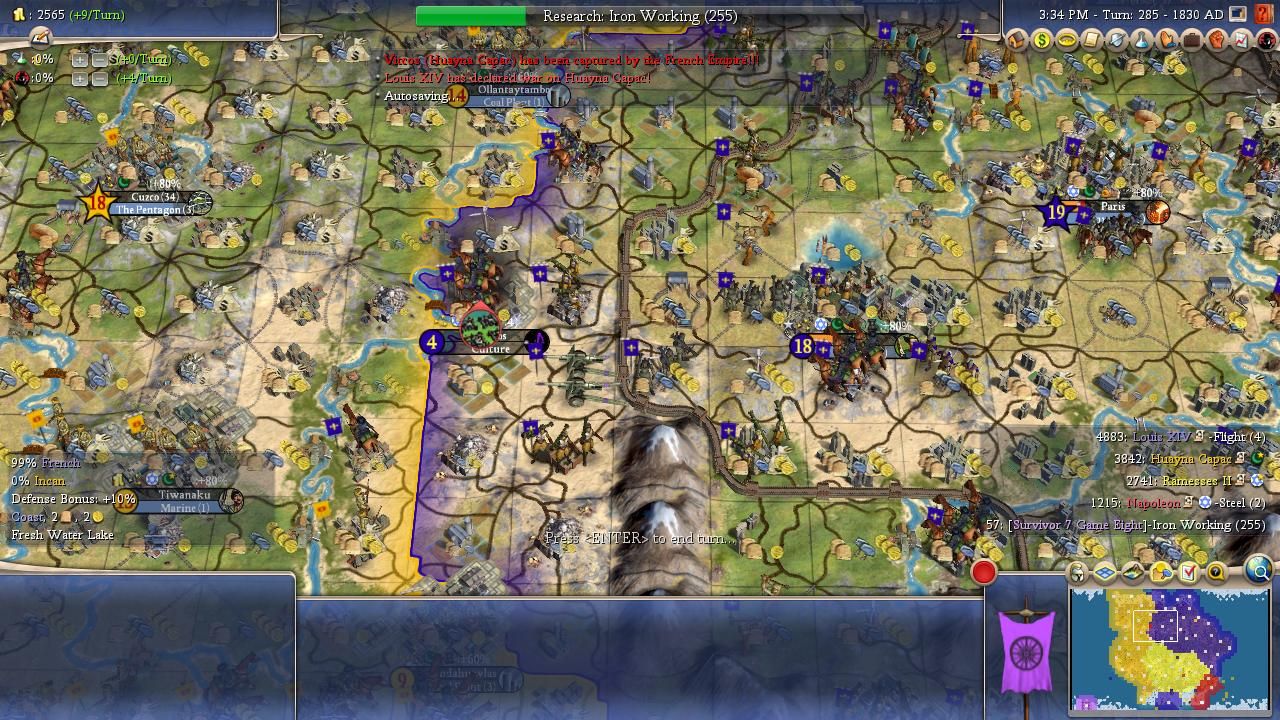
It seemed that Louis had simply decided to delay his victory, and mess around with the game instead. After Huayna had taken all of Napoleon's western cities, Louis called a Stop the War resolution in the UN, got it passed, and so denied Huayna the chance to strike the killing blow. Napoleon survived with a tiny empire on the other side of the map from where he'd started the game - a rarity indeed in Civilization. He could now hunker down in these four cities on the eastern coast, and hope to skate through to the Wildcard game. Louis had even bigger plans than this, though: several turns later, he declared war on Huayna Capac! The Sun King wasn't content to just coast to victory, he wanted to prove his superiority over everyone else! This massive clash of the game's two titans was not at all conclusive in the early turns. Louis had the advantages of the first strike, cultural control over the battlefield, superior numbers, and artillery, but Huayna had infantry and tanks where Louis did not, and neither army achieved a clear breakthrough at first. As these turns ground on, though, both leaders continued to lose power at a roughly equal rate, and this actually meant that Louis was winning the war: he was preventing Huayna from getting the upper hand while he had superior military tech, and once the French leader himself teched Assembly Line and Industrialism, the advantage shifted firmly to him. In addition to several border cities that he'd snapped up in the opening turns, he was able to march in and capture an Incan core city with little trouble, and now Huayna was suddenly in trouble.
And then, just to make things even more tense, Louis turned the culture slider back on! He was now less than 20 turns away from winning, and the massive question was: who would finish in second place? Huayna led Ramesses by about 600 points. Could he hold on to that lead for long enough, or would he lose enough land for the pharaoh to sneak into second place? Ramesses wasn't going to just sit back and rely on Louis, either: with only a handful of turns left, he declared war and moved in against Huayna as well! He had military tech parity with Huayna, and so posed a very real threat indeed in this two-front war. But could he and Louis move fast enough???
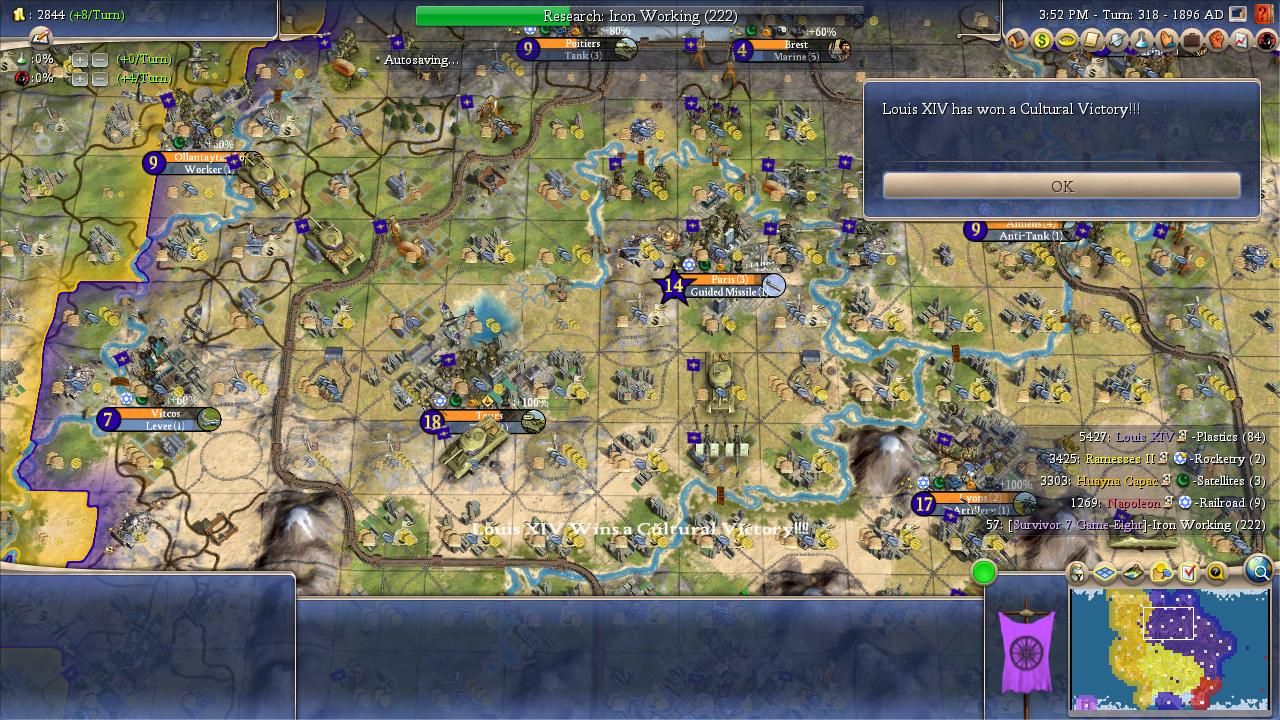
YES!!!!! Louis did diddly squat for the last 20 turns of the game, just suiciding some units against 80% defenses with no siege, but Ramesses took several cities, which proved just enough, as he finished in second place by a mere 122 points. He seemingly was also helped by domestic troubles in the Incan empire: we didn't get any close looks, but Huayna's cities appeared to be starving down significantly due to Industrial era unhealthiness and rampant war weariness. So it was Ramesses in second place! This was a pretty impressive result for the pharaoh given the rough hand he'd been dealt for this game: stuck in a central position with three bordering natural enemies, no metal close by, and on a map where the other two higher peaceweight leaders were the first two killed. Yet this game's twists had gone in his favor: first Genghis saved his butt by backstabbing Louis before he could roll over Egypt, then Napoleon got in wars with Washington and Huayna Capac, never attacking him despite their border tension and peaceweight difference. And then in the lategame, when he was stuck far behind in third place, Louis needlessly attacked Huayna Capac and give him the opening to slip through. Still, aside from his early delay of Iron Working, Ramesses did play well between those strokes of luck: he developed his civ well throughout the game, spread his religion far and wide (possibly diverting his aggressive rivals to other targets in the process), ably turned the tables on Genghis when he declared war, successfully weathered two late attacks from a stronger Louis to stay in it, and crucially, took matters into his own hands and attacked Huayna to cross the line for second place at the end of the game. He would not have made it without that move, and I think the successful attack cements this second place as a deserved outcome, even if this was also just about as well as things could possibly have gone for Ramesses in this setup - he's unlikely to do better than this in the alternate histories. So Ramesses joins Playoff Game One, where four relatively peaceful leaders will be squaring off against Montezuma and a more capable warmonger. Hm, that sounds familiar...
Meanwhile, Louis took the grand prize for this game, and it was a deserving win. He was on top of the scoreboard from the end of the landgrab to the end of the game, and his successful attack of Huayna in the lategame firmly established that he was the one who controlled this map. He never got out to an unstoppable runaway status, and and in particular his failure to more effectively conquer in the later game was a bit puzzling, but apart from the first few turns of a couple of wars, before it became clear how they would play out, there was never much doubt that he would be advancing. He successfully weathered an ill-timed backstab from Genghis Khan, was the only leader to largely solo conquer a rival early on, and from that point on was able to largely coast to victory. We did see this AI's tendency to be torn in multiple directions in this game, though, as he repeatedly changed the victory condition he was aiming for and stopped conquering both Ramesses and Huayna when he had each on on the ropes in the lategame. Louis has proven that he's a leader to watch in these games, but at the same time shown why he's still far from being a seeded leader. In any case, he is going to a Playoff Game 2 that will be filled exclusively with low peaceweight warmongers. Can he navigate his way to his first championship appearance, or will his sun set in the playoff round yet again?
Finally, two more warmongers survive to join what promises to be a VERY violent wildcard game. Up until the closing turns, it had looked like Huayna Capac was a shoo-in to make the playoff round outright; after weathering an early attack from Washington with no real danger, he built his way into a solid position, then successfully conquered the entire western coast to become strong indeed. However, he was thoroughly and unprovokedly trolled by Louis at the end, first getting his conquest of Napoleon denied via the UN, and then getting attacked and just barely knocked out of second place at the very end. Overall I think Huayna played very well for about 80% of the game, but his slow start to the game prevented him from ever becoming a true juggernaut, and then poor fighting at the end (where, remember, he was fighting rifles and cavs with infantry and tanks) cost him second place. As for Napoleon, he continues his legacy of fighting extremely well for a leader who has never won a game, picking up two additional kills in this match. His position was a bit cramped here and I don't think he had any true path to victory - unless perhaps he had snowballed off an early attack of Egypt, which he did not try to do in this game - but he did a solid job with the position that he had, right up until Huayna attacked him at the worst possible moment. It was hardly a master performance - after all, he did at one point choose to attack Charlemagne across the map to no ultimate gain rather than backstab a closer foe - but it was good enough to deserve a Wildcard spot. Randomly conquering four eastern cities, and then having Louis choose to troll Huayna at the end, was enough to save him this time, and he'll have one more chance to advance.
Season 7 has delivered another wacky and memorable opening round, and this game kept that trend going until the end. Ramesses placing second was probably a very unlikely outcome, and the trolling from both Genghis in the early game and Louis in the lategame kept this one lively. Now sixteen of the playoff leaders have been decided, and it only remains to determine the last two via the wildcard game, where this time nine leaders with a maximum peaceweight of 4 will square off. It should be an interesting one for sure. Thanks as always for watching and reading.



